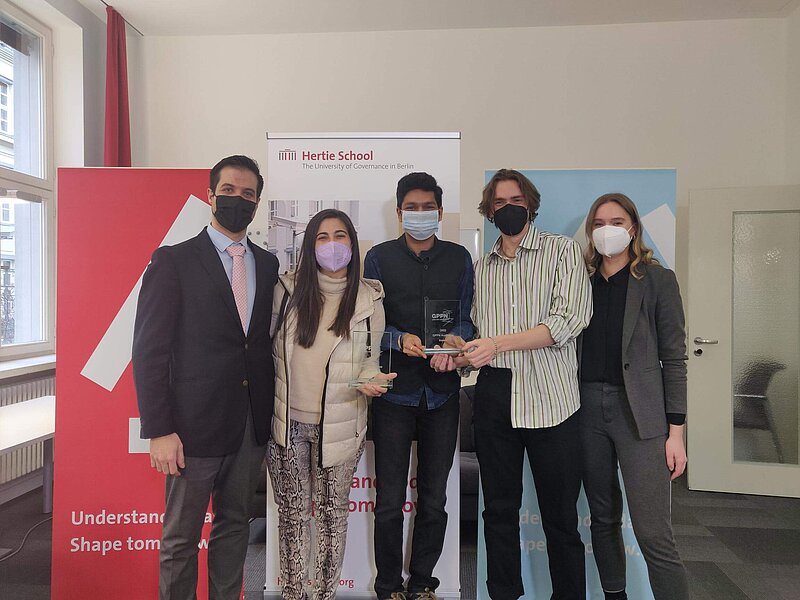From New York to Tokyo, students and faculty from seven international policy schools logged into the conference.
Over 150 participants from the seven member universities of the Global Public Policy Network (GPPN) convened online from 4 to 6 March for their annual conference. The Hertie School hosted the event online, moderated by Master of Public Policy (MPP) student Paula Betzing (2023) and Master of International Affairs (MIA) student Sebastian Y. Wende (2023).
28 student teams pitched and defended their innovative public policy proposals to a jury made up of GPPN deans and faculty, in a competition for the Henrik Enderlein Award for Best Project, named in honor of the Hertie School’s former President and Professor of Political Economy who passed away in 2021. The conference is an important avenue for the school to promote institutional partnership, research collaboration and student exchange, said acting President Mark Hallerberg.
“One of the most rewarding elements of the conference is that one leaves filled with ideas and optimism about the wealth of possibilities that still exist in public policy,” said acting President Mark Hallerberg, encouraging students to keep in touch with one another in the years to come. “The ideas presented in the conference have the potential to go much further, and we have all witnessed what can be achieved through teamwork and partnerships.
This year’s top award went to Lena Tanya Arkawi, Namir Ahmad and Silvana Zapata-Ramirez from Columbia University’s School of International and Public Affairs (SIPA). Their project, called “Sourceable”, aims to provide a platform for documenting, verifying and sharing human rights violations via a secure mobile app. The students hope to empower victims, eyewitnesses, journalists and human rights organisations whose credibility is increasingly under threat of manipulation by advanced technologies.
Hertie School students Arne Arens (MPP 2023), Alice Bisio (MIA 2022), Júlia Cots Capell (MPP 2023) and Sandeep Uma Veera Satya Kalepu (Executive MPA 2021) took home the Runner-up and Audience Awards, winning the popular vote for their “Gute Nachbarn” project. They proposed an intergenerational co-living space for both refugees fleeing conflict and Berlin residents aged 65 and older to tackle the challenges of loneliness, affordable housing and social inclusion.
While the students were competing, the deans of the GPPN schools met to discuss the topic of public policy schools in the face of elections, transitions of power and policy cycles. Nine speakers, including Cornelia Woll, who will take up her new role as Hertie School President on 15 March, discussed different national and institutional contexts and other issues related to the role of public policy schools, such as neutrality, advocacy and political influence.
While the pandemic pushed the conference online, there were plenty of ways for participants around the globe to get to know each other and experience Berlin. Students took part in an interactive workshop delivered by Berlin-based educational organisation planpolitik and explored how public policy students can make their mark on politics. In a special after hours event, participants could experience a typical Berlin bar, network and explore the city via a virtual map together – all while listening to a live techno set curated by student DJ Till Mahler (MPP 2022). The Hertie School also delivered food and drinks to each participant, regardless of their location, to give a taste of Berlin in spite of geographical distances.
In addition to GPPN network members, deans, faculty and students from the Munk School of Global Affairs at the University of Toronto and the School of Public Policy and Management (SPPM) at Tsinghua University also took part as observers.

The GPPN Henrik Enderlein Award for Best Project
Sourceable
Lena Tanya Arkawi, Namir Ahmad, Silvana Zapata-Ramirez – School of International and Public Affairs, Columbia University
Reliable and timely documentation of human rights violations is indispensable for the protection of human rights. This process is critical to ensuring peace, justice, and an inclusive society (SDG Goal 16). However, access to verifiable data is a growing global challenge. With the proliferation of advanced technologies to manipulate data, the credibility of journalists, human rights organizations, and prosecutors is threatened. Our solution empowers victims of and eyewitnesses to human rights violations to document abuses while ensuring the authenticity and safety of their data. Leveraging cutting-edge verification technology, we aim to develop a mobile application and online platform that empowers, connects, and supports communities in documenting abuses. Citizens use the application to document, verify, store, and share content in real-time. The data is then published on our online platform and accessed by our customers - media outlets, human rights professionals, and legal advocates. Our solution amplifies victims’ voices and provides a channel for them to share their reality.
Runner-up Award and Audience Award
Gute Nachbarn: a co-living proposal for Berlin's elderly and young migrants
Arne Arens, Alice Bisio, Júlia Cots Capell, Sandeep Uma Veera Satya Kalepu – Hertie School
As Germany’s population ages, there are more elderly who have lost loved ones or who don’t have any significant connection in their life. Their loneliness is exacerbated by the ever-increasing digitalisation in our social lives, a trend many elderly people may not be able to follow. At the same time, as an increasing number of people flee conflicts and the adverse effects of climate change, there is a need for better integration of refugees in society. Our proposal aims to provide social value by allowing these two groups to positively interact and contribute to solve their common issues. The aim of our project is to develop an economically and socially feasible policy proposal for the public administration in Berlin to jointly tackle loneliness, affordable housing, and social inclusion for the elderly and for refugees. The project consists of an intergenerational co-living that combines housing plans and integration practices, community building and digital technologies for refugees and local population aged 65 or above.
